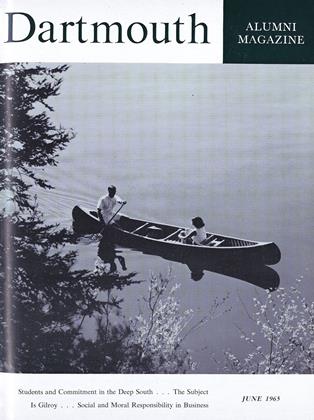By E. Grosvenor Plowman '20. StanfordUniversity, Graduate School of Business,1964. 176 pp.
This volume consists of a series of lectures presented at Stanford in 1962. They represent many years of contemplation on the subject by a student and practitioner of "business logistics" by which term the author means the application of mathematical procedures and co-ordinated decisions to every aspect of place and time utilities that are created to facilitate the production and sale of goods or services by an enterprise. This concept thus includes the flow of goods within a plant or firm as well as shipments into and from the processing point.
Dr. Plowman has taught at Boston University, University of Denver, and recently at Stanford's Graduate School of Business. His operating experience was obtained as traffic manager of the Colorado Iron & Fuel Co. and of the Colorado and Wyoming Railroad, and as vice president in charge of traffic for U.S. Steel Corporation. Lately the author has served as Deputy Undersecretary of Commerce for Transportation Policy. This volume reflects both the author's wide experience and broad perspective. Chapters range from such specific matters as packaging for shipment and warehousing to such broad topics as national transportation policy. The subjects touched on range from air carriers to the zone of reasonableness in rate regulation, while the temporal span runs from descriptions of transportation in the 18th Century through President Kennedy's 1962 Message to Congress on Transportation to the author's projections of the nature of transport in 1999.
The author seeks to analyze both basic business and economic relationships as well as political implications. As a result, every chapter is stimulating and often controversial. One may find fault occasionally with specific statements, but such differences on details are inevitable in so wide-ranging a work, especially when so much is condensed into less than 170 pages of text. The index, which is topically arranged, dispels the perplexity one may experience without it in locating the discussions of some subjects that appear in more than one lecture.
The chief value of this book is the author's provocative and constructive ideas on business logistics for the businessman, on national transportation policy for all citizens, and on the cogent presentation of the relationship between these in a world characterized by continual technological change. These lectures will provide rewarding reading to all who ship by private, contract or common carrier via rail, water, road, air or pipeline, by those who package or store goods, or who are responsible for their movement within a plant, as well as to readers concerned with the defense implications of transportation and the need in peacetime for a national transportation policy that is economically sound and remains so by being responsive to change.
Professor of Economics
 View Full Issue
View Full Issue
More From This Issue
-
 Feature
FeatureStudents and Commitment in the Deep South
June 1965 By BERNARD E. SEGAL '55, -
 Feature
FeatureTHE SUBJECT IS GILROY
June 1965 By RAYMOND BUCK '52 -
 Feature
FeatureSocial and Moral Responsibility in the Modern Corporation
June 1965 By RODMAN C. ROCKEFELLER '54 -
 Feature
FeatureRETIRING PROFESSORS
June 1965 -
 Article
ArticleWITH THE BIG GREEN TEAMS
June 1965 By ERNIE ROBERTS -
 Article
ArticleTHE UNDERGRADUATE CHAIR
June 1965 By BOB WILDAU '65
DANIEL MARX JR. '29
Books
-
 Books
BooksTHE NEW ARGONAUTICA
December, 1928 -
 Books
BooksAlumni Publications
February 1933 -
 Books
BooksShelf life
Jan/Feb 2012 -
 Books
BooksGAIL BORDEN, RESOURCEFUL BOY.
OCTOBER 1965 By CLIFF JORDAN '45 -
 Books
BooksPIGIVACKET-PART I-OLD INDIAN DAYS IN THE VALLEY OF THE SACO
March 1939 By E. P. Kelly '06. -
 Books
BooksTHE GREAT TECHNOLOGY
October 1933 By McQuilkin DE Grange




